Three hours of terror in Orlando
How the Pulse nightclub shooting unfolded in Orlando, rocking a community and a country
Mourners comfort eachother at a vigil in ORlando on June 13th, 2016. (Photograph by Roger Kisby/Redux)
Share
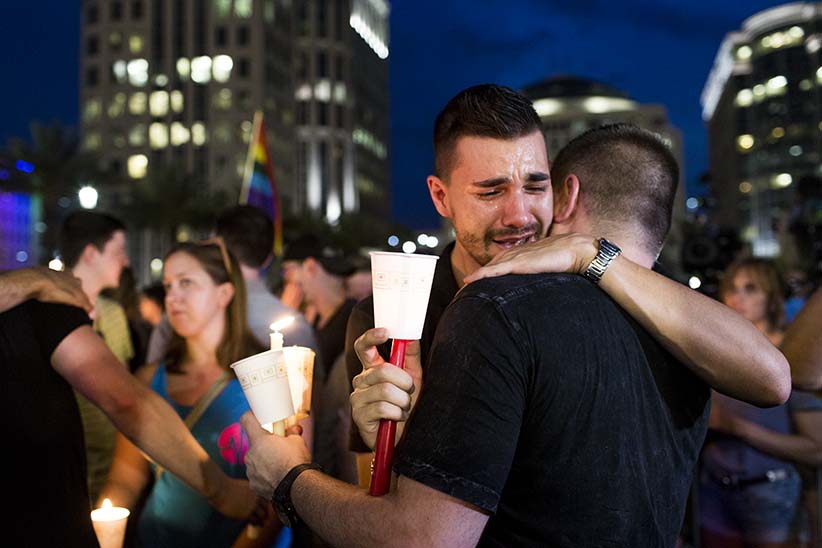
The gunfire sounded a bit like music.
That’s how Patience Carter, 20, of Philadelphia remembers it. For a fraction of a second, the noise of Omar Mateen’s assault rifle sounded like the big, loud, fuzzed-out bass coming from the stacks of the Pulse nightclub. Early that Sunday morning, moments before last call, the Pulse nightclub was a sweaty, Latin-themed riposte to Florida’s air-conditioned reality. Strobe lights were at full tilt, shot boys were dispensing liquid relief, the DJ commanded the crowd to get its hands up. Men and men, women and women, about 300 in total, all together for a proper and altogether normal Saturday night smash at Pulse.
The music cut out, bodies were flying everywhere, in fear or out of injury. Amanda Alvear, 25, recorded her last few moments on a Snapchat video, perplexity blooming into panic as the realization set in.
In the Adonis Room, the smaller of Pulse’s two rooms, Luis Burdano fell to the floor, pulling his best friend and a stranger down with him. He made it out alive. Forty-nine of his fellow Pulse patrons didn’t.
The ensuing three hours were a slow-motion terror. In the bathrooms, Mateen paced, cursed, laughed and rambled in Arabic between bursts of gunfire. He told the many victims huddling under the barrel of his rifle that he “didn’t have a problem with black people,” as Carter would later tell reporters.
Text messages pinged in and phones blared, angering Mateen. Among the many he killed was Eddie Justice, a 30-year-old black man whose last words, “I’m going to die,” were tapped out in a text message to his mother, Mina.
Though Mateen perpetrated the largest mass shooting in modern U.S. history, there was an odd familiarity to the immediate aftermath. As in Newtown, as in San Bernardino, as in Fort Hood, and Virginia and Colorado and the dozens of other mass shootings to have taken place in the United States over the past decade, the Orlando massacre began with a madman with ready access to firearms and ended with a gaggle of the world’s media gathered around a roped-off crime scene.
Beyond those bloodied rooms of the Pulse nightclub, a pioneer and hallmark of Orlando’s LGBTQ community, the struggle to make sense and assign blame was equally familiar. Was Mateen compelled into committing bloodshed by murderous Islamic ideology, given what amounted to his deathbed pledge of allegiance to Islamic State, by way of a 911 call? Or was it mental illness to blame, as his ex-wife suggested?
Mateen picked as a target one of the most conspicuously gay examples in a city built largely on a Disneyesque allure of fantasy. Did he do it out of a genuine hatred of homosexuals, or out of some perverse fear of being gay himself? Either way, several regular Pulse patrons remember seeing Mateen before that night. He was friendly, flirty and trying to pick up other men, as Jim Van Horn told the Associated Press.
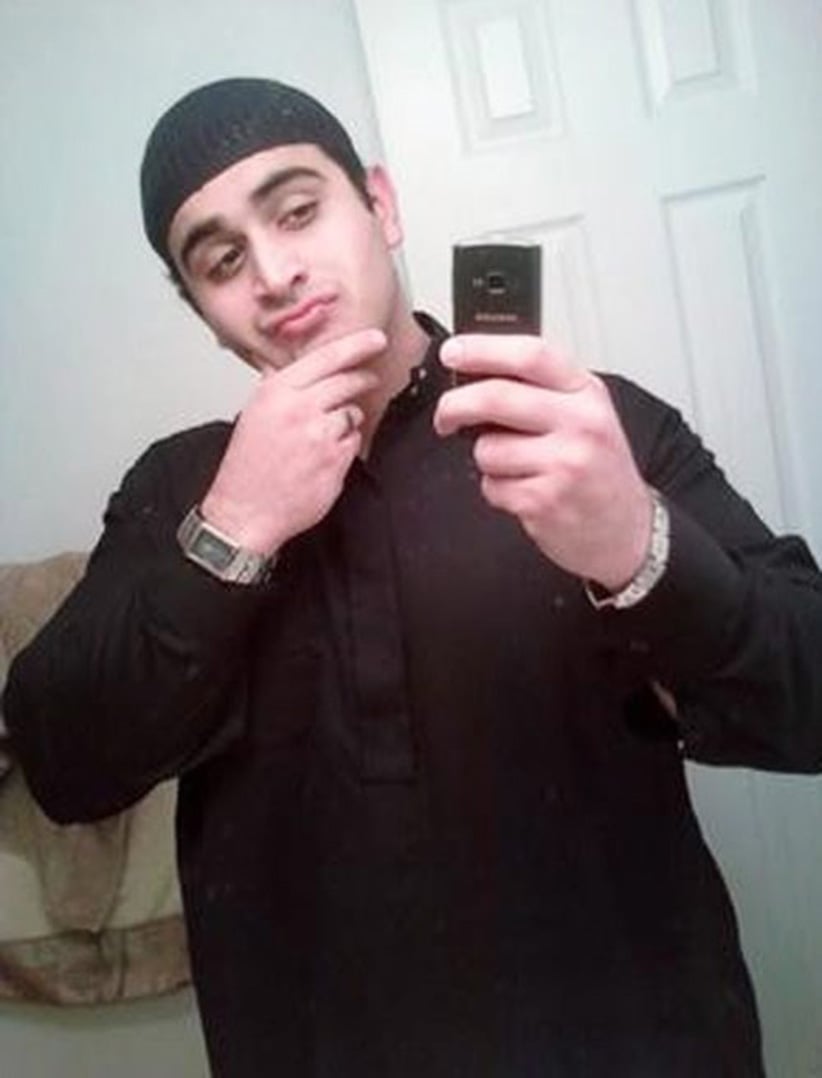
Or perhaps it was a reaction to Islamophobia; after all, Mateen told Carter that he wanted the U.S. to “stop bombing his country”—even though he was born 30 km outside of New York City.
Regardless of his reasoning, Omar Mateen made victims of an already victimized minority in a gay club—the very type of place where gays, lesbians and transgendered people have traditionally found sanctuary. It’s already the worst tragedy for America’s LGBTQ community, which gained the right to marry less than two years ago in the U.S. Now, with a so-called “lone-wolf” attack by an Islamic State convert, the community must wonder whether they’re the next targets in this unprecedented new war, waged by local surrogates on behalf of religious zealots 10,000 km away.
And all of it happened in the midst of an already-heated presidential race. Never have the staples of the American political diet—race, religion, immigration, terrorism and gun control—converged so tragically in a single incident.
There have been 139 mass shootings in America in 2016, according to the Gun Violence Archive. This one has reverberated in quarters that even the slaughter of children at an elementary school in Sandy Hook, Conn., did not. Still, in those three shocking hours, a neon-bedecked nightclub in Orlando also became, in a way, every one of those other places cast into scenes of horror. It was subject to the same forces of fear, courage, random luck and unspeakable sadness on the part of those unlucky enough to be there.
It’s testimony to the schizoid nature of American gun culture that a man could buy a military-style rifle and handgun without raising an eyebrow, yet stir attention by asking for something that might protect him from gunfire.
So it went for the brooding young man who turned up two weeks ago at St. Lucie Shooting Center. The Sig Sauer MCX and Glock 17 pistol he wanted were no problem, acknowledge Ed Henson, owner of the shooting range and gun store, located just outside Port St. Lucie, Fla., a city of about 165,000 located 215 km southeast of Orlando. “If he hadn’t purchased them from us, I am sure he would have got them from another local gun store,” the former New York City police officer told a U.K. newspaper. “This man held multiple security licences. He had an armed and an unarmed licence. He passed the background check that every single person who purchases a firearm in the state of Florida undergoes—a full background check.”
The St. Lucie Shooting Center, however, doesn’t stock the military-grade body armour Omar Mateen also reportedly sought, and in the retail firearms trade, it would have seemed an odd request. Civilians buy guns to shoot, seldom considering that they might get shot at. Who, other than a soldier or SWAT member, would need it? What could he have in mind?
To hear Mateen’s relatives tell it, only he knew. He was born in New Hyde Park, N.Y., to Afghan-born parents who moved the family to Florida when Mateen was five. They worshipped at a mosque in Fort Pierce, Fla., and his father, Seddique Mir Mateen, became a well-known personality in the Afghan diaspora, hosting a TV show where he commented on the politics of his homeland. The elder Mateen is not known as a religious zealot, and he’s insisted that Sunday’s attack had nothing to do with religion. “We weren’t aware of any action he is taking,” he said in his first TV interview. “We are in shock like the rest of the country.”
By all appearances, the family was settling well into American life. Two of Mateen’s sisters, Sabrina and Mary Seddique, became respiratory therapists at St. Lucie Medical Center. “They are adored by everyone here—there’s always a smile, always a hello,” a doctor who works with both told Maclean’s. “We’re worried that with all of this they are going to leave the hospital and go somewhere where they can be anonymous.” (Calls to Sabrina Seddique went unanswered.)
Related: Trump and Clinton contrast in Orlando shooting response
Omar, meanwhile, seemed more interested at first in protecting Americans than slaughtering them. He obtained a community-college degree in “justice technology”—a prelude, he hoped, to a job in policing. Instead, he landed a series of low-paying security jobs, including a stint at Martin Correctional Institute, a state prison, followed by one with G4S Secure Solutions, a massive company that provides guards to everything from courthouses to seniors’ communities. A fringe benefit of Mateen’s state security guard licence: it made firearms acquisitions easy. He held a permit to carry a concealed weapon.
Mateen didn’t seem overly frustrated by his stalled law-enforcement career. But from time to time, he revealed an ugly side to his personality. Graduates of the high school he attended in Stuart, Fla., told the Washington Post Mateen cheered when the second plane struck the World Trade Center—their class had been watching live TV coverage of the attacks. A regular at Gold’s Gym in St. Lucie West, where Mateen held a job as a teenager, recalled him as a fitness buff with a terrible temper, and suspected him of taking steroids. “You could definitely tell there was something not right with him,” Stefan Comvalius told the Tampa Bay Times.
Few saw his meanness as close up as Mateen’s first wife, Sitora Yusufiy. She’d married him in 2008 after meeting him on the social media site Myspace—a spur-of-the-moment decision reluctantly approved by her parents. Yusufiy, whose family emigrated from Uzbekistan in 2000, recalls how his originally charming demeanour changed when she moved in with him in Florida.
“A few weeks after we were married, I saw his instability, I saw that he was bipolar,” she told reporters in Boulder, Colo., where she resettled after divorcing Mateen and remarrying. (It is not known whether Mateen was formally diagnosed as mentally ill.) “He would get mad out of nowhere. That’s when I started worrying about my safety.” Yusufiy said Mateen beat her “very often,” and demanded she turn over her paycheques from her job as a daycare worker. He forbade her from speaking to her family, she added, effectively keeping her hostage from them. After just four months of marriage, she said, her relatives came and rescued her.
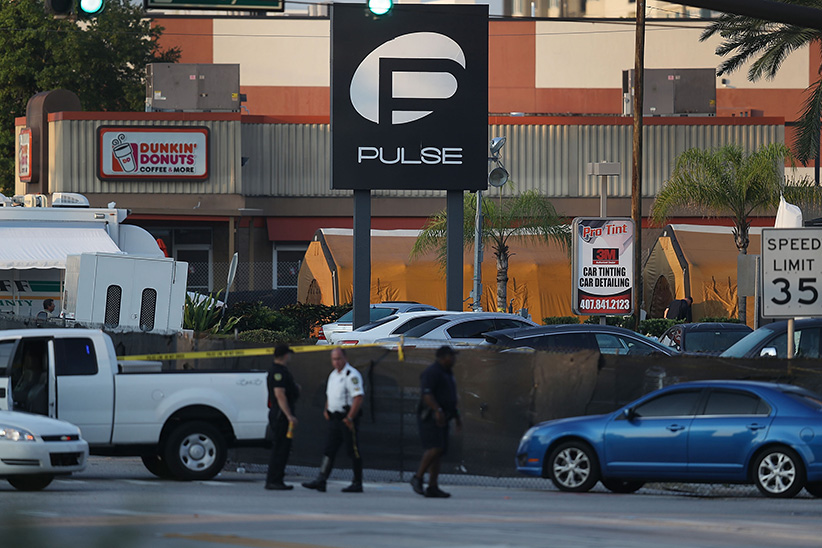
Yusufiy saw no indication that Mateen held radical Islamist views. But she’s one of several close to him who heard him voicing anti-gay bigotry. A former co-worker recalls him using slurs against blacks, Jews and women, while Mateen’s father suggested he’d attacked the club because, during a recent trip to Miami with his three-year-old son, he’d seen two men kissing. “They were kissing each other and touching each other,” Seddique Mir told NBC the day after the attack. “And he said, ‘Look at that. In front of my son, they are doing that.’ ”
Those recollections squared neatly with notions of the massacre as a case of religiously motivated homophobia—at least in the immediate aftermath. Fundamentalist Islam, after all, regards homosexuality as evil, and Mateen had declared loyalty to Islamic State even as he shed blood inside the club. But later accounts overturned this compelling narrative with a stunning revelation: Mateen had been frequenting Pulse on a regular basis—much more often, by witnesses’ accounts, than was necessary to reconnoitre the place.
Ty Smith, a regular at the bar, told the Orlando Sentinel he’d seen Mateen there at least a dozen times in the months leading up to the shooting. “Sometimes he would go over in the corner and sit and drink by himself, and other times he would get so drunk he was loud and belligerent,” Smith said, adding: “We didn’t really talk to him a lot, but I remember him saying things about his dad at times. He told us he had a wife and child.” The Sentinel said it had spoken to four Pulse patrons who’d seen Mateen there before, while another, Kevin West, told the Los Angeles Times that Mateen messaged him on and off for a year on a gay chat app called Jack’d. West said they’d never met up, but that he spotted Mateen entering the club about 1 a.m. Sunday, a full hour before the shooting began.
If Mateen was leading a double life, he would count within a type familiar to members of the LGBTQ community: the self-loathing gay. Yusufiy, his ex-wife, acknowledged in a television interview Tuesday that she believed he had “gay tendencies.” But it was also true that he had married a woman not long after divorcing Yusufiy, settling in a Fort Pierce condominium with their child. Multiple media outlets were quoting FBI sources on Tuesday that his second wife, Noor Salman, knew Mateen planned to carry out a jihadist attack in the indeterminate future, and tried unsuccessfully to talk him out of it.
And whatever was going on in his private life does not erase the clear trail linking him to radical Islamists, starting with his alleged appreciation for the 9/11 terrorists. On Monday, FBI director James Comey acknowledged the bureau had twice investigated Mateen—the first time in 2013 after he told G4S co-workers at a courthouse that he was connected to Hezbollah.
Agents interviewed him and placed him under surveillance, said Comey, but turned up nothing of consequence. Then, in 2014, they circled back to him in light of possible connections to Moner Mohammad Abu-salha, a Florida man who had carried out a suicide bombing on behalf of al-Nusra, the al-Qaeda linked group fighting in Syria’s civil war. Moner and Mateen attended the same mosque in Fort Pierce and knew each other casually, the FBI found. But again, said Comey, they found “no ties of consequence.”
As a result, Comey confirmed, Mateen’s name was struck in 2014 from the U.S. terrorism watch list—a decision certain to come under scrutiny. If he’d been on it, his purchase of the guns in St. Lucie would have been flagged to the FBI. The bureau would not have had legal power to stop the transaction, but they might at that point have kept closer tabs on him.
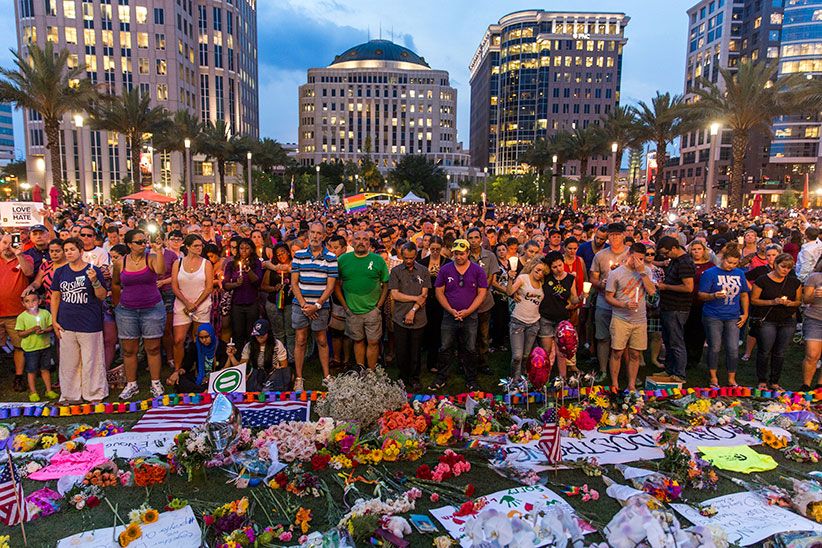
If nothing else, they might have identified him as a potential target for the rhetoric of Islamic State spokesman Abu Muhammad al-Adnani, who in a speech posted on the web in May urged the terror group’s followers in the West to carry out so-called “lone-wolf” attacks during the holy month of Ramadan. Al-Adnani named the U.S. specifically as a target, adding: “The smallest action you do in the heart of their land is dearer to us than the largest action by us, and more effective and more damaging to them.”
There was a touch of the mama’s boy to Stanley Almodovar III, and he wasn’t afraid to show it. On his way to Pulse on Saturday night, the 23-year-old sent a Snapchat video to his mother, Rosalia Ramos, showing him laughing and singing in anticipation of his evening out. “I wish,” Ramos would later lament, “I had that to remember him forever.”
Almodovar, a pharmacy technician, lived with his mom. Anxious that he didn’t go to bed hungry, she’d left a tomato-and-cheese dip in the refrigerator that night for him to eat when he got home. He’d gone to the club with a girlfriend—they were among countless twentysomethings in the Orlando area for whom Pulse represented the perfect blend of revelry, style and openness.
The bar had opened in 2004 on South Orange Avenue, a five-lane thoroughfare that runs north-south through Orlando’s downtown core. The brainchild of Barbara Poma and Ron Legler, the name was a nod to Poma’s brother, John, a gay man who died in 1991 after a long battle with HIV. His heartbeat lived on in the club, Poma has said.
There was local opposition at the time, most notably from the Christ Church of Orlando down the street. “Barb fought them and won,” said Peggy Swope, 55, a long-time resident of the neighbourhood.
Up until the moment Mateen entered the club armed to the teeth, Pulse was best known as a pillar in Orlando’s enduring, vibrant and flourishing LGBTQ community. “Miami is the epicentre of the gay community at its extreme. Orlando is the essence of what the gay community is,” says Corey Lyons, 31, president of Impulse Orlando, an HIV and AIDS awareness and prevention group. “We’re not all about parties. We’re less flashy.”
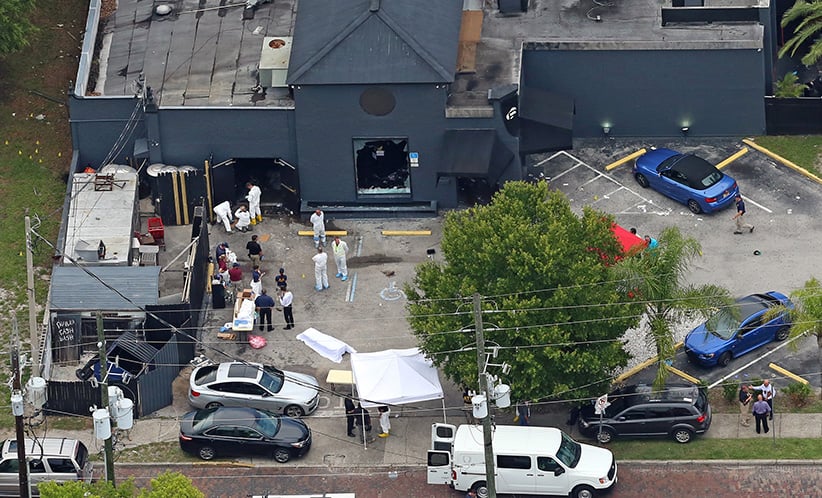
The importance of Pulse to the community is such that a multi-million-selling musician and producer, Justin Tranter, flew to Orlando from L.A., where he was on tour with Selena Gomez, when he heard the news. On Monday, Tranter was stocking water, food and the heaps of donations streaming into The Centre, an LGBTQ support group. “When you are born gay, you are born into a rich culture of politics, music and art, but you are also a minority in your own home. Places like Pulse become your second home. When you go, you don’t have to be a minority for one night. You can love and dance and be prideful forever,” says Tranter, who often brought his mother to Pulse. “I think we now have to accept that people still hate gay people with a passion, just for loving who we love.”
Part of Orlando’s appeal to the LGBTQ community dates back to 1971, with the opening of Disney World. It was an early adopter of gay-friendly policies—a reflection, Lyons says, of the considerable number of gay employees.
After he figured out he was gay, Lyons spent much of his youth ducking out of his home in Jefferson Township, N.J., to go to New York City. Armed with fake IDs, he experienced the heyday of the pre-9/11 gay scene in New York. At 26, he found much the same feeling in Orlando. “New York, Los Angeles, Miami, we gravitate toward these places, but sometimes you don’t realize how much hate there is between these areas,” Lyons says, shaking his head.
Related: Alight for Orlando
The militancy from Orlando’s LGBTQ community has made the city of roughly 2.3 million into one of the notable exceptions to Florida’s reputation for rock-ribbed conservatism. “Being gay in Orlando, we’re afforded a lot of freedoms. At the same time, we’re below the Bible belt in the south, and we’re one of the last places to have gay marriage,” says Lyons. (While gay marriage became legal across the U.S. in 2015, a law prohibiting the practice remains on the books in Florida.) Orlando also serves as a catch-all for LGBTQ youth fleeing difficult family situations. “These kids come here because they live in, like, Iowa and know they’re different,” says Russell Walker, the community development director at Hope and Help, an HIV/AIDS support group.
Considered a gay club, Pulse has long catered to a sizable straight clientele too. In the past few years, bridal parties have become a staple, as have packs of straight college kids coming simply because Pulse blasted the best music. The stage in Pulse’s main room, site of much of the carnage, has hosted everyone from drag queens to male strippers to decidedly heterosexual raunch-rap pioneers 2 Live Crew. “No one’s going to bitch if a straight girl walks into the club,” says Pulse regular Bill Huelsman.
According to several news reports, Mateen had cased out Disney Springs, an open-air collection of shops and restaurants located on the grounds of the resort. Instead, he chose the relative intimacy of Pulse. In the nightclub’s two divided rooms, he was able to corner his victims and stage a nightmare neither this city nor this bullet-strewn country will ever forget.
Related: Want to buy an assault rifle in Florida? No problem
The scene at Pulse on June 11 was pretty typical for a Saturday. More than 200 people packed the sprawling facility. It was “Upscale Latin Night,” an occasion for revellers to dress wildly while getting down to reggae, merengue or salsa tunes. Some spilled onto the patio overlooking South Orange Avenue, where DJ Ray Rivera was playing music, while many others packed the expansive main dance floor inside known as the “Jewel Box.”
It was around 2.a.m., just about last call, when Rivera and others heard a firecracking noise over a reggae tune he was spinning. “Out of nowhere, we just hear a big shotgun,” said one patron, Angel Colon, 26. By the time the DJ killed the music, people were scrambling from the club’s three main rooms. Colon, who was shot in the leg, recalled being trampled by other people trying to escape.
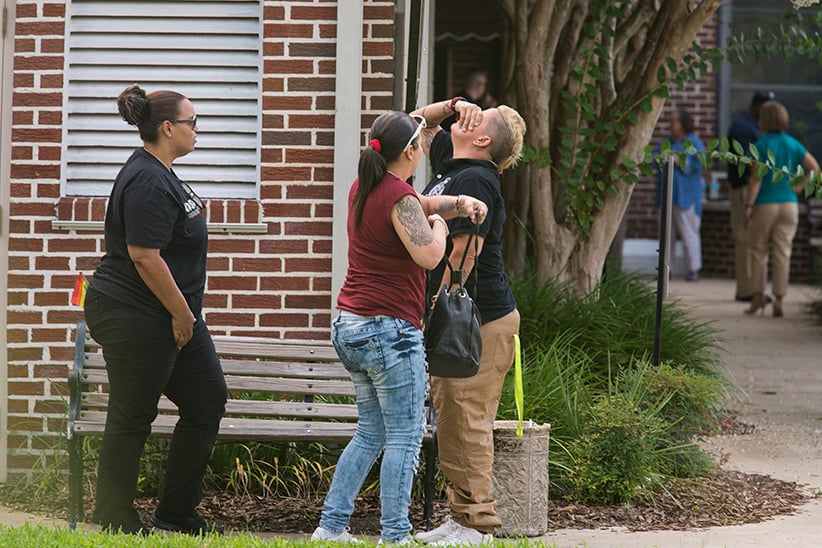
“I look over and he shoots the girl next to me. And I’m just there lying down. I’m thinking, ‘I’m next, I’m dead,” he told reporters on Tuesday at the Orlando Regional Medical Center. The gunman fired at Colon’s head but hit him in his hand. Another shot hit him in the hip, said Colon. Miraculously, he survived.
Frantically looking for anywhere to hide, clubgoers crawled to the bathrooms, hiding in stalls until they were too full. One patron tried to sneak under the stall door, but to no avail. One witness remembered how Mateen entered the washroom and opened fire, laughing all the while.
He shot through the stall doors, at which point those inside begged for their lives. Others played dead. In some cases, Mateen looked over the top of the stall doors, gun in hand, and opened fire below.
According to AP, at 2:06 a.m. Eddie Justice sent his first text to his mom: “Mommy I love you.” He was in one of the bathrooms, as was Mateen. Justice’s mom tried to call her son, but he wouldn’t answer the phone. He wrote her: “Pulse. Downtown. Call police.” “I’m gonna die.”
When Mateen heard a phone go off or noticed people texting, he would demand they give up their devices. No calling. No texting. Justice’s mom texted her son: “I’m calling them now.” “U still in there.” “Answer your damn phone.” “Call them.” “Call me.”
He didn’t reply.
At 2:09 a.m., Pulse posted on its Facebook page, “Everybody get out of Pulse and keep running.”
At 2:22 a.m., Mateen called 911 and told the police he wanted “America to stop bombing my country” and pledged his allegiance to Islamic State, remembers Carter, who was hiding in the handicap stall with a group of people.
Then Mateen calmly engaged in conversation with those in the bathroom—at least those who were still alive. “Are there any black people in here?” Carter, who is black, remembers him asking. She stayed silent, but another black person answered. “I don’t have a problem with black people,” Mateen said. “This is about my country. You guys suffered enough.”
Justice finally got a moment to text his mom at 2:39 p.m., writing: “Call them mommy.” “Now.”
She asked him if anyone was hurt. He wrote back: “Lots. Yes.” She asked if he’s with police. Silence. She wrote again: “text me please.”
Now 2:46 a.m., Justice texted back: “No.” “Still here in bathroom. He has us. They need to come get us.”
His mom wrote: “The police is in there, let me no when u see the police.”
“Hurry,” he wrote back at 2:49 a.m.
“He’s in the bathroom with us.” 2:50 a.m.
His mom asked: “Is the man in the bathroom with u”
“He’s a terror,” Eddie replied. 2:51 a.m. “Yes.”
“Are u hurt,” his mother asked. No reply. 2:52 a.m.
“Stay there he don’t like gay people.” No reply. 2:53 a.m.
“I love u.” No reply. 2:54 a.m.
“Don’t do nothing.” “Stay down.” “Baby text me.”
She never did get a response, and her son never made it home.
Finally, after almost three hours, police officers in an armoured vehicle smashed a hole through the wall, into the bathroom, and after a brief firefight killed Mateen. One officer was shot in the head but was saved by his Kevlar helmet—one of the evening’s only acts of mercy.
At 5:53 a.m., Orlando Police tweeted: “Pulse Shooting: The shooter inside the club is dead.”
The heartbreaking scenes and sounds would roll for hours on news networks—clubgoers, still clothed for a night out, carrying the wounded away from the scene; loved ones of the dead collapsing in grief after rushing to the scene. None captured the raw anguish more poignantly than Rosalia Ramos, recalling the text she received at 2:10 a.m. from a stranger who had tried to stanch her son Stanley’s bullet wounds. “He’d been saying to her, ‘Call my mom, call my mom.’ She said that my son grabbed her hand and said, ‘Don’t let me go, please don’t let me go,’ ” Ramos, 51, told the Boston Herald.
Almodovar, witnesses said, had rushed into the gunfire as Mateen worked his way through the club. He pushed several people out of harm’s way before taking bullets in the chest, stomach and side. “He was a hero,” said a weeping Ramos. “He tried to save other people.”
Even though she rushed to the scene, Ramos was among dozens of family members who waited in agony to identify loved ones as police took stock of the carnage. Many were sent on Monday to a nearby school where bodies had been assembled, crumbling in the parking lot after having their fears confirmed.
By that point, the post-incident second-guessing had already begun. How did a man carrying an assault rifle get in the bar? Did Orlando police use the right level of force at the right time? Did they choose the right point of entry? Under questioning by reporters on Monday, Chief John Mina left open the possibility that some club patrons were killed in crossfire when Mateen erupted from the hole they’d punched in the building, guns blazing. “I will say that is all part of the investigation,” he said. “But I will say when our SWAT officers, about eight or nine officers, opened fire, their backdrop was a concrete wall. And they were being fired upon. So that is all part of the investigation.”
The FBI, meanwhile, was investigating Noor Salman, Mateen’s wife, with a view to levelling charges of concealing knowledge of an impending crime—an offence known as “misprision.” Yet the bureau faces its own tough questions about its assessment of Mateen and, especially, whether he should have been taken off the watch list. When asked if he thought his agents might have done anything differently, Comey said: “So far, the honest answer is ‘I don’t think so.’ ”
That’s not the level of certainty the LGBTQ community might have hoped for, and its renewed sense of vulnerability was evident in the vigils and memorial services held in gay villages throughout North America. In Toronto and Vancouver, police were stepping up security measures for Pride Week festivities—especially parades in which dignitaries like Prime Minister Justin Trudeau are expected to appear.
At the same time, in one of those odd instances of crisis making unlikely allies, statements of support poured in from political leaders who have in large measure stood against gay rights for decades. “Our hearts go out to the people in the LGBTQ community,” tweeted House Speaker Newt Gingrich, who until three years ago staunchly opposed same-sex marriage. From Islamic leaders came the now-familiar reassurance that the actions of the self-radicalized few do not reflect the values of a religion. Imam Muhammad Musri, president of American Islam and a leader of the Central Florida Muslim community, denounced Mateen as a “monster” and implored non-Muslim Americans to show tolerance. “We are against terrorism,” he said. “We are against extremism.”
It has been, in short, a remarkable show of unity—notwithstanding the political frothing on the presidential campaign trail—and, as such, echoes the response seen after the shooting in San Bernardino, after the Boston Marathon, after the attacks of Sept. 11, 2001. It’s what America wants to see, just now. And if the blood would only stop spilling, it might be reassuring.